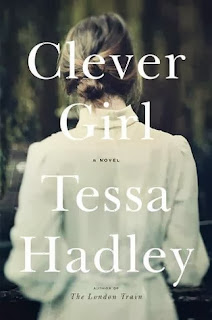Clever Girl
Summary (from the publisher): All the qualities that readers praised in The London Train are present in Clever Girl, Tessa Hadley's brilliant new novel. It follows the story of Stella, from her childhood as the daughter of a single mother in a Bristol bedsit in the 1960s into the mysterious shallows of her middle age. The story is full of drama - violent deaths, an abrupt end to Stella's schooldays, two sons by different fathers who aren't around to see the boys grow up - but as ever it is her observation of ordinary lives, of the way men and women think and feel and relate to one another, that dazzles. Yes, you think. This is how it is.
Review: I received an uncorrected proof copy of this book from HarperCollins.
Told in a series of short stories, (some of which were originally published in the New Yorker) Hadley's novel details the unusual life of Stella. Written like a memoir, Stella recounts her childhood, growing up in the 1960s as the daughter of a single mother in Bristol, her stormy relationship with her stepfather, her first love, her experiences as a single mother, living in a commune, and unexpectedly marrying an older man.
It's clear throughout that the adult Stella is reflecting on her earlier life throughout the novel. For example, she punctuates the recounting of stories saying, "I can't help feeling, thinking about it now" (19). Stella as narrator provides insight and spoilers about what later happens to the characters that make up her early life as she relates her memories to the reader.
The title seems to be Stella's jab at herself. Her life seems to be a series of disappointments and tragedies that reveal to Stella that she's not as infallible as she thinks. "I thought I could still go back, defeated, to my old life. Back home and back to school, and pick up where I left off, and be a clever girl again, and get to university. Even if I could never ever again, in my whole life, be happy. But I wasn't that clever, was I?" (87).
Although the stories are arranged chronologically, one downside to having the chapters written almost as stand alone stories means the narrative doesn't flow smoothly in time. Years may pass between chapters, although it's never clearly defined. It made me wonder what gaps in the story Stella was leaving out, and also made me more conscious of how Stella is swaying the reader through her narration.
Interestingly, Stella's reading habits (or lack thereof) are referenced throughout the novel. Stella will reference books she was reading at the time of memories she recounts; "I think I was ploughing then through The Forsyte Saga" (66). Later, she scorns her stepfather's reading habits; "Already, individually however, I had an inkling that the books he read were somehow not the real books" (69). Additionally, Stella's reading habits and interests are in flux throughout her life. Early in life she loves lengthy classics. When she starts dating Valentine, she picks up his reading habits, saying, 'I didn't talk to him about the old-fashioned books I used to love before I met him" (74). Later, Stella refuses to read although she says her friend Fred was "always trying to persuade me to read grown-up books [...] I had been a reader once, when I was a girl" (151). But Stella admits to the reader that she's lying; "When Fred tried to persuade me to read books and I told him I was too busy, it wasn't the truth. Actually, I was reading all the time. [...] For some reason I wanted to keep my reading secret" (160). Stella's changing reading habits reveal a lot about her and was one of her most interesting character traits for me.
Something about Stella's seeming lack of deep attachments to others kept me from connecting to her. Stella speaks dispassionately about her parents, the fathers of her sons, her children, and her husband. She doesn't seem to wholeheartedly love anyone without reservation. Bold proclamations to the reader such as, "Of course I regretted it, marrying Mac Beresford. Often I regretted it" (197) make her distance from her family clear. Of course part of this may be because Stella is telling her history from the distance of years past, yet I still had a hart time believing she would remain distant from everyone in her life.
Stars: 3



Comments
Post a Comment